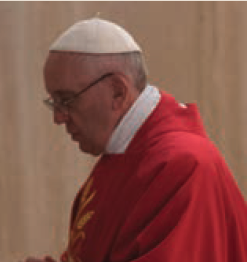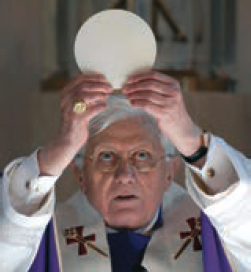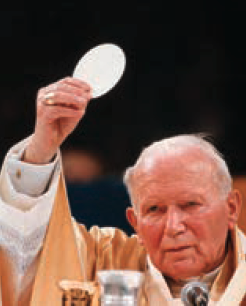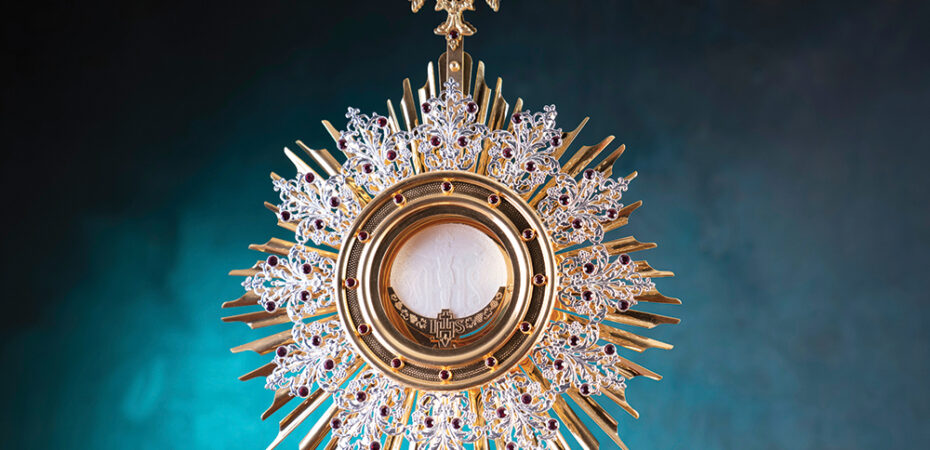The Fruits of Eucharistic Adoration
Engaging the Real Presence with a genuine Eucharistic mindset
Father Adrian Burke Comments Off on The Fruits of Eucharistic Adoration
As a seminary spiritual director, I am sometimes asked by directees how I would recommend they spend their Holy Hour before the tabernacle in chapel. Early on in their formation, prayer in the Blessed Sacrament chapel might seem awkward for some, since they aren’t sure what to do. Some fill the hour with reading their Bible or other devotional material, some pray a Rosary, and yet others engage in contemplative meditation. One seminarian I work with decided he would “kill two birds” by taking course material into the chapel to prayerfully read for an hour before the tabernacle.
None of these is wrong, of course, as even a prayerful reading of seminary course material isn’t all bad (though I’m not sure it’s ideal either). I think that the ripest spiritual fruit is available when we engage Christ’s presence in the Blessed Sacrament with a genuinely Eucharistic mindset. Therefore, let’s reflect on some of the ripe fruits Eucharistic adoration offers the Church, fruits especially supportive of those ordained to preside at the holy Mass, the most comprehensive way the Church expresses the presence of Jesus Christ and itself as his body.
In a post-conciliar instruction of the Second Vatican Council, Eucharisticum Mysterium (“On the Worship of the Eucharistic Mystery”), by the Sacred Congregation of Rites, we read: “The mystery of the Eucharist is the true center of the sacred liturgy and indeed of the whole Chrisitan life. Consequently the Church, guided by the Holy Spirit, continually seeks to understand and to live the Eucharist more fully” (No. 1).
These introductory words are important and highly suggestive. They say, in effect, that the Eucharistic mystery is not something that can be understood apart from the unfolding life of the Church and the lives of her members. The Eucharist is not a static thing but a dynamic principle of life: the true center of the whole Christian life. Each member of God’s Church has been baptized into Christ, who is the head of this body, and thus we participate in Christ, sharing Jesus’ mission of redemption.
The Church itself, therefore, is the reality to which the Eucharistic mystery points — that is, the Totus Christus, “the whole Christ” glorifying the Father in and through the works of his Son, Jesus Christ. Through the outpouring of his life-giving Spirit upon his disciples, “[Christ] has established his body, which is the Church, as the universal sacrament of salvation” (Lumen Gentium, No. 48), signifying in a real and manifest way the continued presence of Christ dwelling in the world and doing the works of the Father. The Eucharist is the fullest expression of the wholly present Christ, though it is not the only expression of his Real Presence, since all the actions of the Church, its liturgical and apostolic works of various kinds, are actions of Christ insofar as they are inspired and motivated by his Spirit and are done in Jesus’ name.
Piety
The teachings of the Vatican II encouraged the faithful to cultivate a sincere Eucharistic piety through time spent in adoration of Christ present in (and as) the Blessed Sacrament reserved in the tabernacles of our chapels and churches. “They should remember that this presence derives from the sacrifice [of the Mass] and is directed towards both sacramental and spiritual Communion” (Eucharisticum Mysterium, No. 50). In other words, through prayer before the Blessed Sacrament we allow the Spirit to cultivate in us a deep awareness of and belief in the participative reality of our life in Christ. As faithful disciples of Jesus, we belong to him, even as he belongs to us, for we are bound to him in the Spirit, “one body, one spirit in Christ” (Eucharistic prayer III), and in Christ “merit to be coheirs to eternal life” (Eucharistic prayer II).
Eucharistic piety flows from the Spirit and nurtures friendship with the Lord. Jesus has revealed to us his Father’s plan for our redemption (cf. Jn 15:15) and, through the gift of his Spirit, Christ enables those who would be his disciples to share in his atoning act of love (cf. Lk 14:27). “In consequence, the devotion which leads the faithful to visit the Blessed Sacrament draws them into an ever deeper participation in the Paschal Mystery” (Eucharisticum Mysterium, No. 50), the supreme service the Lord Jesus rendered for humanity’s redemption. Eucharistic adoration stimulates delight in serving Christ by taking up his cross. Such commerce with the crucified and risen Lord provides a hermeneutic lens, so to speak, for insight into the redemptive power contained in human suffering by virtue of Christ’s sacred humanity. Eucharistic adoration centered on the Paschal Mystery thus hones the mind’s capacity to perceive and judge reality by the light of this central mystery of redemption, the heart of the Christian Gospel. This capacity is constitutive of the Holy Spirit’s gift of discernment.
………………………………………………………………………………………………………………………………………….
Need for Eucharistic Adoration and Evangelization
Pope Francis, in the apostolic exhortation Evangelii Gaudium (“The Joy of the Gospel”), explores what it takes to be spirit-filled evanglizers. He notes the importance of cultivating an interior space which can give meaning to the evangelizing commitment and activity:
“Without prolonged moments of adoration, of prayerful encounter with the word, of sincere conversation with the Lord, our work easily becomes meaningless; we lose energy as a result of weariness and difficulties, and our fervor dies out. The Church urgently needs the deep breath of prayer, and to my great joy groups devoted to prayer and intercession, the prayerful reading of God’s word and the perpetual adoration of the Eucharist are growing at every level of ecclesial life” (No. 262).
…………………………………………………………………………………………………………………………………………..
In his encyclical letter Lumen Fidei (“The Light of Faith”), Pope Francis reflects on the evangelizing mission of the Church to invite others to walk with us. He teaches that the “the act of Jesus’ love which brought new life to the world comes down to us through the memory of others — witnesses — and is kept alive in that one remembering subject that is the Church” (No. 38). We keep alive the collective memory of the Church “who teaches us to speak the language of faith” (No. 38) and commissions us to share it with others.
Eucharistic adoration is a means by which the faithful can intensify their remembrance of him. Faith, writes Pope Francis, is closely united to memory as both are considered works of the Holy Spirit who, as Jesus taught, will “remind you of all that [I] told you” (Jn 14:26). Eucharistic adoration instills in the faithful a profound awareness of our communion with the whole Christ, head and body, and intensifies our vocation to share in Jesus’ mission to proclaim the good news, because his Spirit dwelling in the Church “unites every age and makes us contemporaries of Jesus, thus guiding us along our pilgrimage of faith” (Lumen Fidei, No. 38).
Baptismal Character
To believe that the Eucharist points to and makes real the presence of Christ is tantamount to believing in who we are as members of his body, the Church. Meditating on the attributes of baptismal character in Eucharistic adoration can help the faithful intensify a sense of self endowed by the character of Christ, an identity rooted in and sustained by the Eucharist. In the practical life, the faithful convey Christ’s priestly character when, in imitatio Christi, they surrender something of themselves to pursue the genuine good of others; clergy, religious and the laity alike share Christ’s priestly character in this sense.
As those sealed in the Holy Spirit, the baptized also have a share in the prophetic ministry of Jesus. By the public positions we take, especially in defending the dignity of the marginalized and the poor, we proclaim the “politics” of the Gospel and demonstrate that we believe in the transformative Word of God, manifesting in the guise of the least among us (cf. Mt. 25:40).
Finally, baptized into Christ the Good Shepherd, we gather what has become scattered, unite what sin and selfishness have divided, strive to bind up the wounded, seek the lost, sustain others in their suffering and encourage them in their struggles. When praying before the Blessed Sacrament, it befits the faithful to focus their meditations on these dimensions of our common baptismal vocation.
A Eucharistic People
Back to the quote from Eucharisticum Mysterium with which we began this reflection — the Church teaches that the Eucharist is the source and “true center” of the Christian life, hence, Eucharist is meant to be lived in the faithful. We are God’s holy people, united to Jesus Christ as his body, the Church, and thus we are a “Eucharistic people.” In a sense, each of the modes of Christ’s presence within the Eucharistic liturgy can also be said to be active in each of the faithful, according to their vocational state in life. “‘This practice of [Eucharistic] adoration has a valid and firm foundation,’ especially since belief in the real presence of the Lord has as its natural consequence the external and public manifestation of that belief” (Eucharisticum Mysterium, No. 49). In other words, how we live our lives, the choices we make and the actions we take, ought to find their source in the Eucharist, manifesting Christ’s continuing presence in the world.
Spending time in Eucharistic adoration disposes the faithful to receive the gift of God’s communication through spiritual communion insofar as the faithful bring to mind and ponder, even in the silence of deep contemplation, the fullness of Christ’s real presence under the species of the Eucharist — a presence “called ‘real’ not in an exclusive sense, as if the other kinds of presence were not real [that is to say, his Word proclaimed and preached; the body of the faithful gathered in his name; the person of the minister], but ‘par excellence’” (Eucharisticum Mysterium, No. 9; cf. Pope Paul VI, Mysterium Fidei, No. 39).
It is incumbent upon priests especially to demonstrate belief in the Eucharist in harmony with our way of life, exhorting the faithful to this and setting a good example for those we serve (cf. Presbyterorum Ordinis, No. 18). Since it is the role of priests to preside at the Eucharistic liturgy, it is especially vital that priests “seek and fervently pray that God will grant them the spirit of true adoration whereby they themselves, along with the people committed to them, may intimately unite themselves with Christ the Mediator of the New Testament, and so as adopted children of God may be able to call out ‘Abba, Father’ (Rom 8:15)” (No. 18).
Regular periods of focused meditation before the tabernacle or the exposed Blessed Sacrament, pondering our role as baptized disciples of Jesus and ordained ministers of the “double table” of word and sacrament, disposes us to the grace that consolidates priestly identity, nourishing and sustaining one’s priestly vocation as participant-sharers in the one true priesthood of Jesus Christ.
Writing this short article has intensified my desire for a robust Eucharistic piety and spirit of true adoration; I hope reading it inspires the same in you!
FATHER ADRIAN BURKE, OSB, is a Benedictine monk and priest of St. Meinrad Archabbey in Indiana, where he ministers as a retreat master, spiritual director, and assists in formation work for both the seminary and monastic communities.
………………………………………………………………………………………………………………………………………………………
Papal Insights on Adoration

“One cannot know the Lord without this habit of adoring, of adoring in silence. … I believe, if I am not mistaken … this prayer of adoration is the [prayer] least known by us, it is the one we do the least,” [as if it were a] “waste of time before the Lord, before the mystery of Jesus Christ.” [We should rediscover] “the silence of adoration: he is the Lord and I adore him.”
— Pope Francis, morning mediation in the Chapel of the Domus Sanctae Marthae, Oct. 20, 2016
…………………………………………………………………………………………………………………………………………………………..

“I heartily recommend to the Church’s pastors and to the People of God the practice of Eucharistic adoration, both individually and in community. Great benefit would ensue from a suitable catechesis explaining the importance of this act of worship, which enables the faithful to experience the liturgical celebration more fully and more fruitfully. Wherever possible, it would be appropriate, especially in densely populated areas, to set aside specific churches or oratories for perpetual adoration. I also recommend that, in their catechetical training, and especially in their preparation for first holy Communion, children be taught the meaning and the beauty of spending time with Jesus, and helped to cultivate a sense of awe before his presence in the Eucharist.”
— Pope Benedict XVI, Sacramentum Caritatis, No. 67.
…………………………………………………………………………………………………………………………………………………………..

“It is the responsibility of pastors to encourage, also by their personal witness, the practice of Eucharistic adoration, and exposition of the Blessed Sacrament in particular, as well as prayer of adoration before Christ present under the Eucharistic species. It is pleasant to spend time with him, to lie close to his breast like the Beloved Disciple (cf. Jn 13:25) and to feel the infinite love present in his heart.”
— Pope John Paul II, Ecclesia de Eucharistia, No. 25
……………………………………………………………………………………………………………………………………………………………





